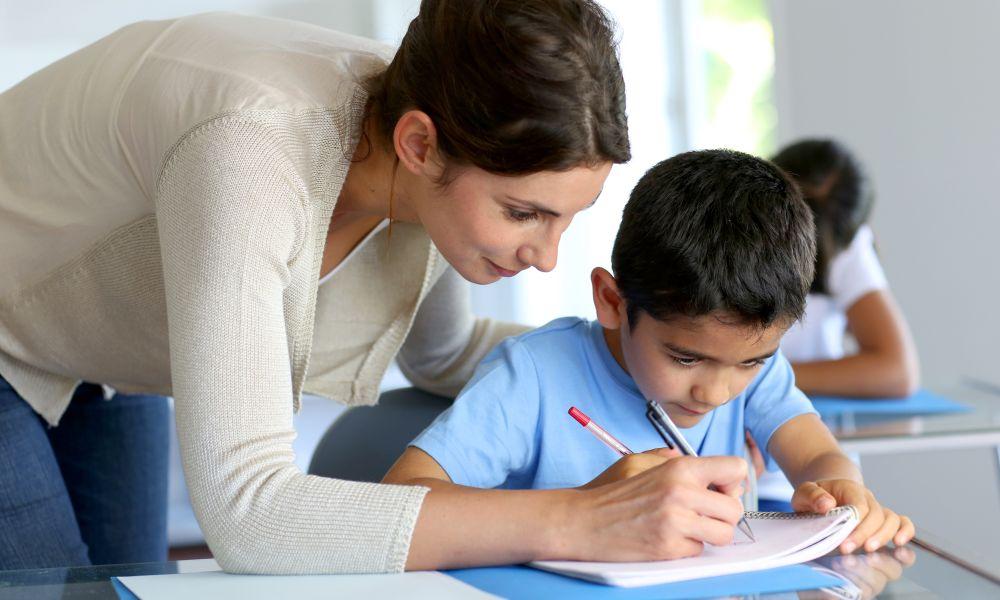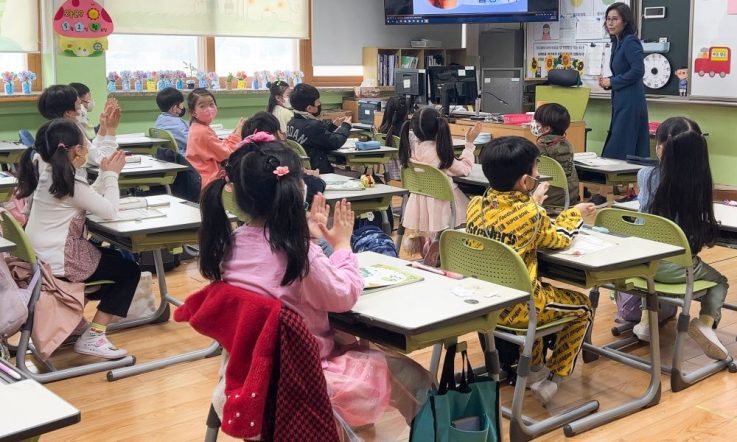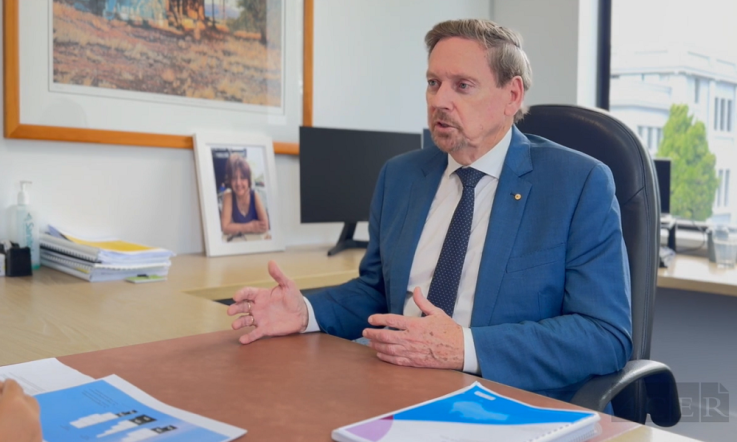This podcast from Teacher is supported by MacKillop Seasons, whose Seasons for Life project supports schools with loss and grief following a suicide and other loss event.
Hello and welcome to this podcast from Teacher, I'm Jo Earp. My guest for this special miniseries is Professor Geoff Masters, CEO of the Australian Council for Educational Research. His new book, Building a World-Class Learning System, Insights from Some Top-Performing School Systems, explores what's happening in British Columbia, Estonia, Finland, Hong Kong, and South Korea. In the first episode, we talked about the big questions that school systems around the world are grappling with. We also looked at some of the reforms in these 5 jurisdictions, including the core characteristics of a world-class curriculum. So, our topic for today then, is creating the conditions for all students to learn successfully. And a reminder, if you want to just pause now and download the book before we begin the discussion, I’ll pop a link in the transcript of this episode, which is at teachermagazine.com. I hope you enjoy the episode.
Jo Earp: Hi Geoff, welcome back to episode 2, it's always a pleasure to have you on the podcast. So, last time we talked about core characteristics of building a world-class curriculum and some of those commonalities across the 5 jurisdictions. Once that curriculum’s in place, then, the question (which is a big question) is how to ensure all students have the opportunity to learn successfully. So, growth, excellent ongoing progress. In your book you explain that the 5 jurisdictions that you studied have all given a high priority to ensuring that every student has an opportunity to learn successfully and that there are 2 basic preconditions to achieving this. So, firstly, no student is denied access to learning opportunities available to others.
Geoff Masters: Yes, that's correct. So, what you can see in these 5 school systems is that they go to some lengths to ensure that there's a level playing field, in the sense that students are not disadvantaged by their different backgrounds and their different circumstances. We know in every country in the world, students sometimes are disadvantaged by the backgrounds they come from.
So, these school systems do things like make sure that every student has access to the same curriculum. Now, that wasn't always the case. If you think about Finland, for example, go back to prior to the 1970s, they had 2 streams of schools. You went into one stream if people thought you were headed towards an academic/leadership future, or you went into a vocational stream, this was basically out of primary school. They did away with that and introduced comprehensive schools, which was a massive transformation of their school system. They continued though with streams within comprehensive schools, but what they began to realise was that boys and students from lower socioeconomic backgrounds tended to be in the lower stream, and they were disadvantaged because they weren't achieving the kinds of outcomes that they needed if they were going to be successful in the senior secondary school. So, Finland over time has moved to comprehensive arrangements where every student has access to the same learning opportunities.
Hong Kong similarly has worked to do this. They talk about one curriculum framework for everybody, meaning that everybody should have access to the same opportunities. Other things that these school systems do to try to ameliorate or remove the impact of background is provide every student with a hot meal every day, so that nobody's disadvantaged by the fact that they're coming to school hungry. They will often provide free, or heavily subsidised textbooks. If they introduce a requirement, as some have recently, that students have iPads or other devices, they will provide those devices or again subsidise them heavily to make sure that nobody's disadvantaged by the fact that their families can't afford them.
They do what they can to ensure that every school is a good school, and every student has access to a good teacher. Now, I guess every school system can say that they do that, but what you see in these school systems is that they go to some lengths to ensure that that's the case, to ensure that their better teachers are in more disadvantaged schools. For example, they will introduce arrangements as Hong Kong has to try to ensure that students from particular kinds of backgrounds aren't concentrated in particular schools. So, they'll work to remove those kinds of differences in an attempt to ensure, to the extent that they can, that students are starting on a more or less level playing field.
JE: Mm-hmm. So that access to opportunities is one of the basic preconditions, and then the second one is ‘creating conditions conducive to each students’ learning?’ What do you mean by that?
GM: Well, what you can see in these school systems is there's that first step of ensuring that we have a level playing field to the extent that we can, but then within that also what they do is to recognise that students, nevertheless, are often at very different points in their learning. Some students are much more advanced than others, and there are multiple reasons for that. So, they do what they can to understand students’ backgrounds, their starting points, and to adapt to those differences. They'll look at things like cultural background, socioeconomic background, but they'll also look at things like addressing students’ interests and motivations, and where they currently are in their learning. So, this second point is, within the general attempt to ensure a level playing field, they then do a pretty good job of working out how to identify firstly and then address the differing needs of individual students.
JE: And the word ‘all’ in that phrase, all students, of course, is vital isn’t it. Each jurisdiction, then – so, a reminder it's British Columbia, Estonia, Finland, Hong Kong and South Korea – they've all placed a big emphasis on developing more inclusive learning systems, as you were mentioning there. The first part of that is common expectations as well. In the book you talk about there being no sidetracks. I just want to read this quote actually from the book: ‘There are no sidetracks with different expectations for different learners. Every student has access to a comprehensive school and progresses through the same curriculum.’ That's one of the comments from the book.
GM: Yes, yes, that's the point I was making earlier that if you start putting students into streams, the consequence of streaming is often to lock students into different streams. You often set ceilings on how far some students can progress in their learning, because if they're in a lower stream they're often never going to be taught more advanced material, no matter how they perform. And streaming often labels students as well, permanently, in some cases.
So, the point here about no sidetracks is that ideally every student is on the same path of learning. Yes, they're not all at the same point at the same time, but every student is on the same path of learning, and the expectation is that every student should be able to make ongoing progress if we can meet them where they are and address their current needs. And eventually every student should be able to achieve high standards given sufficient time. So that's the basic point that I was making in the book.
JE: So, for that to happen then with a common curriculum, the conditions need to be conducive to successful learning. This is where we get into that question of equity and progress, isn't it – and there's a difference between equity and equality, isn’t there.
GM: Yes, there is a difference between equity and equality. I mean, some people think that what is fair is to treat everybody equally. In this context, teach them the same curriculum, at the same time, for the same amount of time, have the same expectations of every student regardless of their age or circumstances.
Equity for me is not equality. Equity is achieved by identifying and addressing the different needs that students have; going to the trouble of understanding where they're at in their learning, understand the background that they come from, the impact that cultural differences may have on their ability to be integrated into the school system and to learn successfully. So, yeah, equity is about recognising individuals as individuals and going to the trouble of meeting them where they are.
JE: OK, then. Again, lots to talk about after the break, and we’ll be back after this quick message from our sponsor.
You’re listening to a podcast from Teacher magazine, supported by MacKillop Seasons, whose Seasons for Life project supports young people affected by suicide and other loss events throughout Australia. Free for Australian high schools and based on the strong evidence-base of the Seasons for Growth change, loss and grief education programs, the Seasons for Life project builds wellbeing, resilience, social and emotional coping skills, and strengthens supportive relationships.
JE: Welcome back to part 2 of Teacher’s miniseries on world-class learning systems. I'm here with Professor Geoff Masters, and we were talking about equity and progress before the break there. I know that listeners in Australia will be eager to hear a bit more about what's happening in British Columbia. We mentioned in the last episode that sometimes Australia and Canada are compared, aren't they. Just to place it on the map then – it’s a province in Canada, Western Canada, it includes the city of Vancouver (if you know Canada at all). And as I say, it's a country that's often compared to Australia in terms of school education, in particular meeting the needs of Indigenous students. There is something like 200 distinct First Nations in British Columbia. When we think about inclusive learning systems, then, British Columbia in particular, that's made a real shift from a deficit to a strengths model. Can you share some examples from your study of what that might look like?
GM: Yes, British Columbia is an interesting system for a number of reasons. Firstly, it historically has had quite a large immigrant population – so right from the beginning, really, beginning of white settlement anyway, they have had quite a focus on how you integrate immigrants into the community, into society and how the school system can cater for the needs of immigrants. And it continues to be the case that there are significant immigrant populations in British Columbia, and efforts are made to address those needs.
Another feature of British Columbia is that, like Australia, it has quite a number of remote areas and so there are the same sorts of challenges that we face in ensuring the delivery of quality teaching, quality education to remote parts of the country. And then, as you've been saying, Jo, there's the First Nations people. And British Columbia, I think, has done an unusually good job in their school system of thinking about how they can provide all students with an understanding of First Nations culture, First Nations language.
So, they have something that they've called The First Peoples Principles of Learning and what that document makes clear is that, as you say, there are different First Nations people within British Columbia, but what the document makes clear is that First Nations people have different ways of knowing, they have different ways of learning. They see learning being embedded in memory and history, and story, as requiring and involving patience and time, and they place quite a priority on exploring one's own identity. So, what British Columbia has been attempting to do is to build First Nations ways of knowing and learning into their curriculum, not just for First Nation students, but for all students, so that there's a better understanding.
JE: And they've also made that shift to the strengths-based, haven’t they, rather than a deficit model – which takes into account, you know, what students have experience in and what they’re good at rather than, you know, seeing what's ‘wrong’.
GM: Yes, yes, exactly. And that's partly what the First Peoples Principles of Learning does, it says there may be differences here, but let's see those as strengths and build on those, not think about the deficits that arise because you're an immigrant but let's use the strengths that you bring with your own background and culture and so on.
JE: Makes sense. Under British Columbia's framework for enhancing student learning then, there are also requirements, I was reading in your book, there are requirements for partnerships to again support inclusion not just for Indigenous students though.
GM: Yes, yes, that's right. The system, the [Education] Ministry in British Columbia encourages local boards of education to work with their local communities to find ways to ensure inclusion, to ensure that all students whatever their backgrounds, whatever their circumstances, are included in schooling. So, it's not just a challenge for schools, it's a challenge for local communities to ensure inclusion.
JE: Mm-hmm. So that might be students who are in care, or, as we were saying, Indigenous students, it might be students with disabilities or diverse abilities. So yeah, a whole range there.
GM: Absolutely.
JE: So those partnerships then, they're an additional support to the expertise of teachers and leaders that exist in school. In Korea, then, in South Korea, there's a mentoring system that's run by university students, isn't there?
GM: Yes, yes. I mean what we're talking about here in a general sense is the ecosystem within which schools work. So, what you can see in these jurisdictions is that they often make extraordinary efforts to draw community resources in to support the work of schools. And the particular example you're referring to there is Korea’s use of university students to support the learning of students in schools, so that's a mentoring scheme that has been developed.
South Korea also has what they call general learning clinics that they've established across the country, particularly for low-income families and also multicultural families and North Korean defectors, but anybody really who needs additional support in their learnings, they've established clinics outside the main school structure to provide that additional support where it's needed.
JE: Mm-hmm. So, this idea of creating the conditions doesn't just fall with the schools and the teachers and leaders. But yeah, the whole community really, and experts outside the school. You also make the point in the book that although these 5 jurisdictions have a strong commitment to equity and inclusion, there are growing inequalities in some. What are some of the current challenges and how are these different jurisdictions responding?
GM: Well, one of the challenges that a number of these jurisdictions are facing – and Finland and Estonia would be examples – is that there has been, particularly recently, a rapid increase in the number of immigrants, often refugees, into these countries. So, the percentages of the school population that immigrants represent have increased significantly. So, they often come from disadvantaged backgrounds, they're living in lower socioeconomic circumstances. Of course, language is often an issue with students who are new arrivals not speaking the language of instruction and often not being literate in their own language as well.
So, these are challenges that places like Finland and Estonia are addressing. Finland, for example, provides immigrant students with the opportunity to study in their own language, in their mother tongue, part of each week, so they're not requiring them to use the Finnish language. Hong Kong faces similar challenges, and they have ways of supporting students who are new arrivals, at least for a period after they first arrive, in their learning of English, sometimes they're learning of Chinese as well. And they will work at ensuring that students are prepared and are ready to move into full-time school. Korea also has counselling services and welfare services for students of immigrant families, North Korean defectors.
So again, these programs are all designed to recognise that students are coming with different needs; that if they're going to succeed in the school system, they will need particular kinds of support, and the kind of support that's required will differ for different students, and these systems are very focused on how they can provide that support.
JE: Mm-hmm. In in these countries then, with that support is that nationwide? Or province-wide in the case of British Columbia?
GM: Yes, yes. Largely what I've been talking about here are systemic responses. It's not just the local response, it's what the Ministry of Education or the Government is doing as a response.
JE: Yeah, because that's often one thing as well, isn't it? You get pockets of really good ideas or really good practice, and it's about how to scale that up. So, yeah, so as we were talking about responding to those challenges, maybe challenges of immigration and other challenges as well. So, it's ongoing reform really.
OK then, that brings us to the end of episode 2. We've talked mainly about the preconditions to successful learning, but also touched there on the support that individual students need – that's going to be the topic actually for the final instalment of this mini-series on world-class learning systems, meeting individual student needs. Plenty to talk about there, so I'll look forward to that one. And again, if you want to download a copy of the book before we have that episode, just head over to the transcript of this podcast and I'll pop a link in there. But for now, though, Professor Geoff Masters, thanks for sharing your expertise with Teacher.
That’s all for this episode, if you want to keep listening now, you can access more than 300 episodes in the Teacher archives over at teachermagazine.com or wherever you get your podcasts from. Before you go though, my usual request, please take a moment to leave a review on our podcast channel – it helps people like you to find the podcast and it’s a really big support for the team, so thanks for that.
You’ve been listening to a podcast from Teacher, supported by MacKillop Seasons, Seasons for Life, supporting schools and young people affected by suicide and other significant losses. Visit mackillopseasons.org.au.



